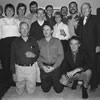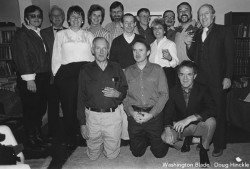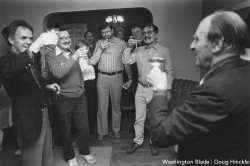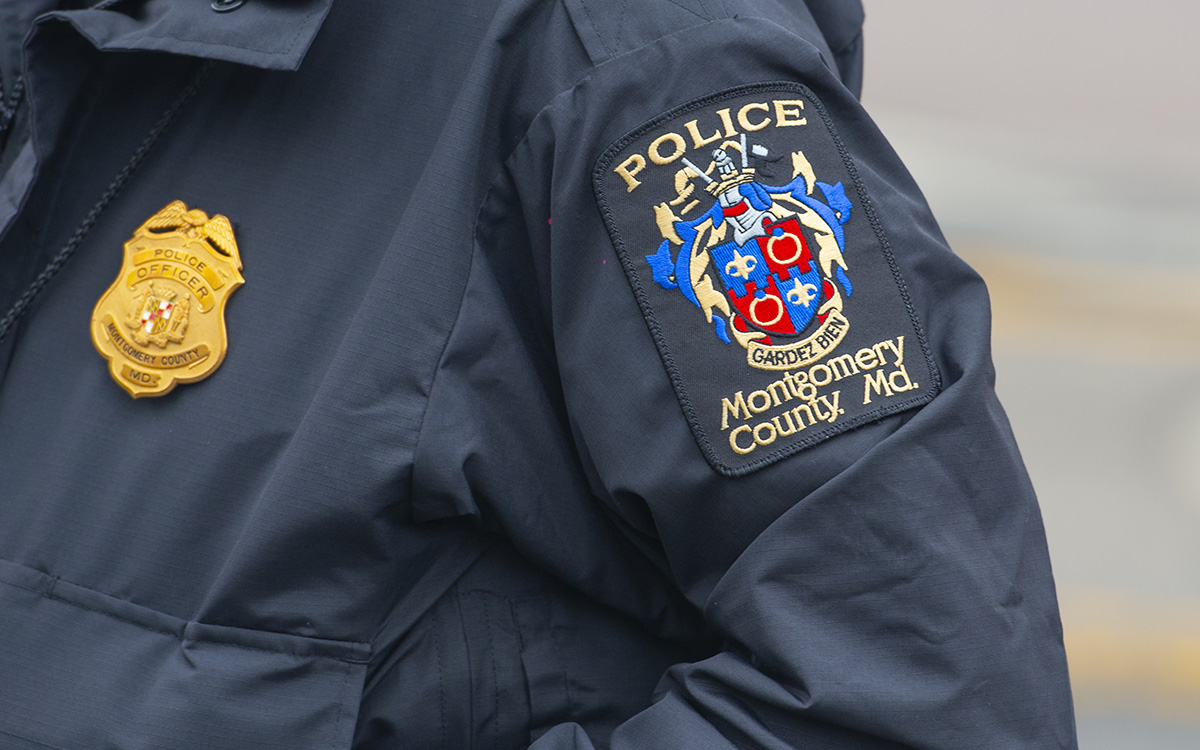Local
Mattachine founded 50 years ago
D.C. ‘homophile’ group remembered as first civil rights organization for gays


Frank Kameny, one of Mattachine’s founders, died last month, just prior to the organization’s 50th anniversary. The city staged a farewell for Kameny last week a the Carnegie Library. (Washington Blade file photo by Doug Hinckle)
Records kept by the late gay rights pioneer Frank Kameny show that Kameny and fellow activist and native Washingtonian Jack Nichols co-founded the Mattachine Society of Washington, D.C., on Nov. 15, 1961 as the city’s — and nation’s — first homosexual civil rights organization.
Kameny, then 36, and Nichols, 23, were joined by at least three others on that day at the group’s first official meeting, held in the Harvard Street, N.W., apartment of Earl Aiken, one of the group’s first members, according to information obtained by D.C.’s Rainbow History Project.
LGBT activists and Kameny’s friends and colleagues in D.C. and across the nation are scheduled to gather in Washington at the Cannon House Office Building on Capitol Hill next Tuesday, Nov. 15, for a memorial service celebrating Kameny’s life and legacy. The gay rights leader died at his home in Washington on Oct. 11. Organizers say the gathering will also commemorate the 50th anniversary of Kameny and his gay rights colleagues’ founding of the Mattachine Society of Washington.
The Rainbow History Project reports that an example of the hostile climate the fledgling group was to face in its first few years of existence in the early 1960s surfaced three months before its official launch, when Kameny organized a preliminary meeting to discuss the need for forming a homosexual rights group.
When Kameny and others sat down at the start of that meeting, held at the Hay Adams Hotel on Aug. 1, 1961, Kameny quickly discovered the gathering had been infiltrated by Louis Fouchette, the head of the Perversion Section of the D.C. Police Department’s Morals Division.
“Fouchette was identified, exposed, and left the meeting,” Rainbow History Project reports in one of its papers on the Mattachine Society of Washington.
Kameny told the Blade years later that he and others attending the August 1961 meeting viewed Fouchette’s visit, and the fact that he learned of plans to form a gay group before it even held its first meeting, as a chilling reminder of the work that lay ahead for the group.
In part because Mattachine’s organizers knew that discovery by authorities, including police, of someone’s status as a gay person would almost certainly lead to the loss of their job, the group adopted a bylaw making it mandatory that all members except Kameny use a pseudonym to identify themselves publicly. The pseudonyms would also be used on Mattachine’s membership list.
Among those complying with this requirement were Mattachine members Nichols, who later went on to become an accomplished author, journalist and out gay activist; Robert King, Lilli Vincenz, Paul Kuntzler, Eva Freund; Ron Balin; and Jon Swanson, according to Rainbow History’s reports on the group.
Each of them played a key role in Mattachine Society of Washington’s groundbreaking work, including the group’s first-ever homosexual rights protest demonstrations in the 1960s at the White House, Pentagon, Civil Service Commission and other government buildings.
Kuntzler later co-founded the D.C. Gay Activist Alliance, which later became the Gay and Lesbian Activists Alliance, and the Gertrude Stein Democratic Club, two of D.C.’s leading LGBT advocacy organizations that continue to operate today.
Back in 1961, Kameny chose to use his real name in connection with the Mattachine Society of Washington because he already suffered what he believed to be the irreversible consequences surrounding his firing in 1958 from his job as a civilian astronomer at the U.S. Army Map Service after authorities discovered he was gay.
“He knew he was essentially blacklisted for life in his profession as an astronomer, where, at the time, everybody knew each other in that profession,” said author and Kameny biographer David Carter. “So he had nothing to lose.”
Carter, who interviewed Kameny extensively during the past several years, said Kameny told him he chose to be one of the few “out” gays at the time following his unsuccessful but highly acclaimed appeal of his firing to the U.S. Supreme Court.
Kameny wrote his own brief to the high court as a document known as a Petition for a Writ of Certiorari, which asked the court to take on his case. In 1961, the Supreme Court denied his petition and upheld a lower court decision that refused to back a Kameny lawsuit seeking to force the U.S. Civil Service Commission to overturn his firing.
The lawsuit and his petition to the Supreme Court marked the first known time a gay person had challenged the U.S. government policy of refusing to hire and automatically firing gay people from federal government employment in any capacity or position.
Kameny’s 61-page Supreme Court petition, which is now part of the Kameny Papers collection at the Library of Congress, is viewed today by historians as the first comprehensive gay rights manifesto in the United States.
Carter, who is writing Kameny’s biography, said the Supreme Court petition became the founding principles used by Mattachine Society of Washington to carry out its work calling for equality and non-discrimination for homosexuals in employment and a wide range of other areas.
Origin of ‘Mattachine’ name

Local activists commemorate the 25th anniversary of the founding of the Mattachine Society on Nov. 15, 1986. (Blade archive photo by Doug Hinckle)
There were other Mattachine Society groups created by gays in other cities beginning in Los Angeles in 1950. But nearly all of them acted as clandestine groups seeking to promote a better understanding of homosexuals, with most agreeing with the then prevailing view by psychiatric professionals that homosexuality was a mental disorder.
The Mattachine name was first adopted in 1950 by pioneering gay rights activist Harry Hay, the lead founder that year in Los Angeles of the first such group. Hay said he took the name from a French medieval and renaissance group known as Société Mattachine, which operated within the royal court as court-jester type figures wearing masks to conceal their identity. In some cases the Mattachines were believed to have been given liberty to speak frankly to the ruling monarch on matters that others were forbidden to discuss.
Carter said Kameny favored using another name for the Washington group that boldly used the word homosexual in its title. He said Kameny told him he was outvoted by the other members, who thought “Mattachine” was a name widely recognized within the nation’s homophile movement.
While insisting on adopting Mattachine Society as its name, Carter and others familiar with the group said the members agreed to Kameny’s request that it remain independent of other Mattachine Society groups, with whose philosophy and tactics Kameny disagreed.
None of the other Mattachine Society groups, including those located in L.A., San Francisco, and New York, took on the role of a civil rights and civil liberties organization like the Mattachine Society of Washington did.
“They certainly were the first to take that position,” said Carter, in discussing Mattachine Society of Washington’s activist, civil rights stance. “And the second unique thing about them is their attitude or strategy. They took a militant approach toward achieving that goal, an unapologetic approach,” he said.
“It is time that a strong initiative be taken to obtain for the homosexual minority – a minority in no way different, as such, from other of our national minority groups – the same rights, provided in the Constitution and the Declaration of Independence, as are guaranteed to all other citizens,” the Mattachine Society of Washington said in an August 1962 statement.
“These include the rights to the pursuit of happiness and to equality of opportunity; the right, as human beings, to develop and achieve their full potential and dignity; and the right, as citizens, to be allowed to make their maximum contribution to the society in which they live – rights which Federal policy and practice now deny,” the statement says.
In what Carter and others following the LGBT rights movement say was a first of its kind development, the group launched a four-point campaign in 1962 calling for repeal of the U.S. Civil Service Commission’s policy barring gay employees, which it called unconstitutional; an end to the U.S. military ban on gay service members; an end to the federal government policy of denying security clearances for gays; and the repeal of state sodomy laws that made it illegal for consenting adults of the same sex to engage in private sexual relations.
Kuntzler said the group went one step further by taking what others in the homophile movement at the time considered a radical action. Following a heated debate among its members at an April 1965 meeting, Mattachine Society of Washington adopted a formal resolution declaring that homosexuality was not a mental disorder.
The resolution, introduced by Kameny, opened the way for the group to begin a national campaign to pressure the American Psychiatric Association to remove homosexuality from its diagnostic manual as a disorder.
Kuntzler said he recalls members voted 27 to 5 to approve the resolution, with the group’s then president, Bob Belanger among those who voted against it.
“The Mattachine Society of Washington takes the position that in the absence of valid evidence to the contrary, homosexuality is not a sickness, disturbance or other pathology in any sense but is merely a preference, orientation, or propensity on par with and not different in kind from heterosexuality,” the resolution states.
Kuntzler also recalled that the group got an unexpected flurry of publicity in the summer of 1963 when then U.S. Rep. John Dowdy (D-Texas), who chaired the House committee overseeing D.C. affairs, called a public hearing on a bill he introduced to curtail the activities of the Mattachine Society of Washington.
The Washington Post reported in an Aug. 10, 1963 story that Dowdy became outraged when he learned that a D.C. government agency had granted Mattachine a license to solicit charitable contributions in the city as a fundraising tool. The Post story said Dowdy’s bill called for overturning the city’s approval of the group’s charitable solicitation license and called for barring the city from approving any future license to any organization whose existence threatened to harm “the health, welfare and morals” of the city.
Kameny drew widespread media coverage when he testified at the hearing in opposition to the bill and challenged Dowdy’s assumptions that homosexuality was a “perversion” harmful to society. A representative of the D.C. chapter of the American Civil Liberties Union also testified against the bill, saying it was unconstitutional because it would infringe on Mattachine’s First Amendment right of freedom of expression.
Kuntzler said that much to Dowdy’s horror, the testimony by Kameny and the ACLU official resonated with the public and media, prompting a Post editorial opposing the bill and calling Dowdy a “moralist.”
The bill eventually died in committee. The brouhaha surrounding its introduction and the hearing helped to boost the Mattachine Society’s message of equality and non-discrimination for gay people, Kameny and other members of the group concluded at the time.
The Mattachine Society of Washington became less active following the Stonewall riots in New York in 1969, which was considered a momentous development in the gay rights movement that led to the creation of a plethora of other gay groups, including D.C.’s short-lived Gay Liberation Front.
According to Kuntzler, nearly all of Mattachine’s small corps of remaining members devoted their time and energy in 1971 to Kameny’s historic run as the nation’s first known openly gay candidate for Congress. Kameny became one of five candidates competing for the newly created non-voting delegate seat in the House of Representatives to represent D.C. in Congress.
Mattachine members, among other things, organized a first-of-its-kind “gay” questionnaire for each of the candidates running in the race, asking them to state their views on gay-related issues, including whether they would support legislation to ban discrimination against homosexuals in employment.
All but Kameny ignored the questionnaire, Kuntzler said. But he said the questionnaire and the election-related work performed by Mattachine members laid the groundwork for the type of gay rights work assumed by the Gay Activists Alliance, which formed as the recognized successor to Mattachine Society of Washington immediately following Kameny’s run for Congress.
Kameny finished fourth in the election, receiving 1,888 votes or 11 percent of the total, Kuntzler recalls. In a development that surprised many and delighted LGBT activists, Kameny finished ahead of the Rev. Douglas Moore, the fifth place candidate who denounced homosexuality and gays as being “immoral” and a threat to the community.
“It was a very nice place to be,” said lesbian activist Lilli Vincenz, who said she joined Mattachine Society of Washington in 1962 after being discharged from the Women’s Army Corps, or WACs, on grounds of homosexuality. “I was glad to be a part of it.”
Vincenz was among many of the group’s early members who went on to successful professional careers in the D.C. area while they continued to participate in the LGBT rights movement. All of them switched to using their real names.
Eva Freund, who, like Vincenz and Mattachine member Nancy Tucker, became among the group’s first female members, continued to participate in LGBT-related causes. She currently serves as president of a D.C.-area information technology services company.
Vincenz received a doctorate degree in psychology and operated a therapist practice specializing in helping lesbian and gay clients. Kuntzler became an advertising executive for a non-profit association and his longtime domestic partner, Steven Miller, who also participated in Mattachine activities, became the owner of a successful court reporting business.
Tucker and Vincenz also became coordinators of a Mattachine newsletter project that led them to found an independent gay newspaper in the city in October of 1969 called the Gay Blade, which later evolved into the Washington Blade.
Maryland
Montgomery County police chief discusses arrest of trans student charged with planned school shooting
County executive tells news conference student’s trans identity is irrelevant to criminal charge

Montgomery County, Md., Police Chief Marcus Jones joined other county and law enforcement officials at a news conference on Friday, April 19, to provide details of the police investigation and arrest of an 18-year-old high school student charged two days earlier with threats of mass violence based on information that he allegedly planed a mass shooting at the high school and elementary school he attended in Rockville, Md.
In charging documents and in a press released issued on April 18, Montgomery County Police identified the arrested student as “Andrea Ye, of Rockville, whose preferred name is Alex Ye.”
One of the charging documents states that a friend of Ye, who police say came forward as a witness who played a crucial role in alerting authorities to Ye’s threats of a school shooting, noted that Ye told the witness that Ye identified as the transgender student he wrote about as a character in a 129-page manifesto outlining plans for a school shooting. Police have said Ye told them the manifesto was a fictional story he planned to publish.
At the news conference on Friday, Police Chief Jones and other law enforcement officials, including an FBI official and Montgomery County Executive Marc Elrich, referred to the student as Alex Ye and Mr. Ye. None of the officials raised the issue of whether Ye identified as a transgender man, seven though one of the police documents identifies Ye as a “biological female.”
County Executive Elrich appeared to express the views of the public officials at the news conference when one of the media reporters, during a question-and-answer period, asked Elrich why he and the others who spoke at the news conferment failed to “admit that this individual was transgender.”
“Because it’s not a lead,” Elrich replied, asking if the press and law enforcement authorities should disclose that someone arrested for murder is “a white Christian male who’s heterosexual.” Elrich stated, “No, you don’t – You never publish somebody’s sexual orientation when we talk about this. Why you are focusing on this being a transgender is beyond me. It’s not a news story. It is not a crime to be transgender.”
The reporter attempted to respond but was cut off by the press conference moderator, who called on someone else to ask the next question.
In his remarks at the press conference Chief Jones praised the so far unidentified witness who was the first to alert authorities about Ye’s manifesto appearing to make threats of a mass school shooting.
“Now, this is a situation that highlights the critical importance of vigilance and community involvement in preventing potential tragedies,” Jones said. “I commend the collaborative efforts of the Montgomery County Police Department, the Federal Bureau of Investigation, the Rockville City Police Department, and the Montgomery County Public Schools, as well as Montgomery County Health and Human Services,” he told the gathering.
“Thanks to their swift action and cooperation a potentially catastrophic event was prevented,” Jones said.
Jones pointed out that during the current school year, police have received reports of 140 threats to the public schools in Montgomery County. He said after a thorough investigation, none of them rose to the level where an arrest was made. Instead, police and school officials took steps to arrange for the student making the threats and their parents to take remedial action, including providing mental health services.
“But this case is different,” Jones said. “This case is entirely different that takes it to a different level. It was a concerned witness who brought this matter to light by rereporting the suspect’s manifesto to the authorities. This underscores the value of community engagement and the ‘see something say something’ approach,” he said.
Jones mentioned at the press conference that Ye was being held without bond since the time of his arrest but was scheduled to appear in court for a bond hearing on Friday shortly after the press conference took place to determine whether he should be released while awaiting trial or continue to be held.
In his manifesto obtained by police, Ye writes about committing a school shooting, and strategizes how to carry out the act. Ye also contemplates targeting an elementary school and says that he wants to be famous.
In charging documents reported on by WJLA 7 and WBAL 11, the 129-page document, which Ye has referred to as a book of fiction, included writings that said, in part:
“I want to shoot up a school. I’ve been preparing for months. The gun is an AR-15. This gun is going to change lives tomorrow … As I walk through the hallways, I cherry pick the classrooms that are the easiest targets. I need to figure out how to sneak the gun in. I have contemplated making bombs. The instructions to make them are surprisingly available online. I have also considered shooting up my former elementary school because little kids make easier targets. High school’s the best target; I’m the most familiar with the layout. I pace around my room like an evil mastermind. I’ve put so much effort into this. My ultimate goal would be to set the world record for the most amount of kills in a shooting. If I have time, I’ll try to decapitate my victims with a knife to turn the injuries into deaths.”
Maryland
Rockville teen charged with plotting school shooting after FBI finds ‘manifesto’
Alex Ye charged with threats of mass violence

BY BRETT BARROUQUERE | A Montgomery County high school student is charged with what police describe as plans to commit a school shooting.
Andrea Ye, 18, of Rockville, whose preferred name is Alex Ye, is charged with threats of mass violence. Montgomery County Police and the FBI arrested Ye Wednesday.
The rest of this article can be found on the Baltimore Banner’s website.
District of Columbia
New D.C. LGBTQ+ bar Crush set to open April 19
An ‘all-inclusive entertainment haven,’ with dance floor, roof deck

D.C.’s newest LGBTQ+ bar called Crush is scheduled to open for business at 4 p.m. on Friday, April 19, in a spacious, two-story building with a dance floor and roof deck at 2007 14th St., N.W. in one of the city’s bustling nightlife areas.
A statement released by co-owners Stephen Rutgers and Mark Rutstein earlier this year says the new bar will provide an atmosphere that blends “nostalgia with contemporary nightlife” in a building that was home to a popular music store and radio supply shop.
Rutgers said the opening comes one day after Crush received final approval of its liquor license that was transferred from the Owl Room, a bar that operated in the same building before closing Dec. 31 of last year. The official opening also comes three days after Crush hosted a pre-opening reception for family, friends, and community members on Tuesday, April 16.
Among those attending, Rutgers said, were officials with several prominent local LGBTQ organizations, including officials with the DC Center for the LGBTQ Community, which is located across the street from Crush in the city’s Reeves Center municipal building. Also attending were Japer Bowles, director of the Mayor’s Office of LGBTQ Affairs, and Salah Czapary, director of the Mayor’s Office of Nightlife and Culture.
Rutgers said Crush plans to hold a grand opening event in a few weeks after he, Rutstein and the bar’s employees become settled into their newly opened operations.
“Step into a venue where inclusivity isn’t just a promise but a vibrant reality,” a statement posted on the Crush website says. “Imagine an all-inclusive entertainment haven where diversity isn’t just celebrated, it’s embraced as the very heartbeat of our venue,” the statement says. “Welcome to a place where love knows no bounds, and the only color or preference that matters is the vibrant tapestry of humanity itself. Welcome to Crush.”
The website says Crush will be open Tuesdays and Wednesdays from 4 p.m. to 12 a.m., Thursdays from 4 p.m. to 2 a.m., Fridays from 4 p.m. to 3 a.m., Saturdays from 2 p.m. to 3 a.m., and Sundays from 2 p.m. to 12 a.m. It will be closed on Mondays.
Crush is located less than two blocks from the U Street Metro station.
-

 Africa5 days ago
Africa5 days agoCongolese lawmaker introduces anti-homosexuality bill
-

 District of Columbia1 day ago
District of Columbia1 day agoReenactment of first gay rights picket at White House draws interest of tourists
-

 World5 days ago
World5 days agoOut in the World: LGBTQ news from Europe and Asia
-

 Arizona2 days ago
Arizona2 days agoAriz. governor vetoes anti-transgender, Ten Commandments bill









